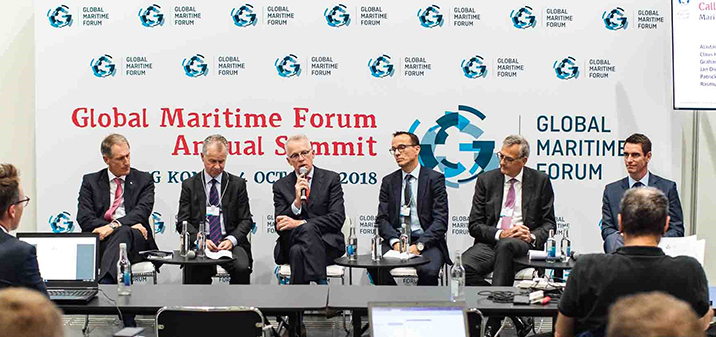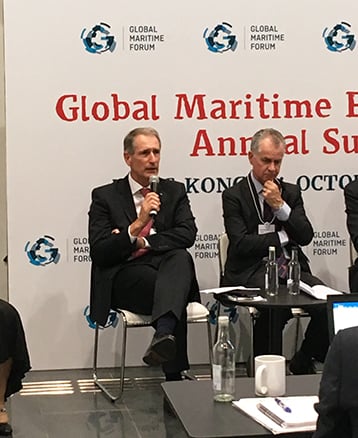LR CEO Alastair Marsh is part of the group that aims to lead the maritime industry in a transition towards a new decarbonised future.
- Climate science requires the maritime industry to phase out greenhouse gas emissions as soon as possible and demands urgent action, say industry leaders.
- CEOs support IMO climate strategy to reduce the total greenhouse gas emissions by at least 50% by 2050.
- CEOs recommend that the IMO’s Roadmap to a decarbonised future be aligned to 7 core principles: ambitious, predictable, market-oriented, technology-enabling, urgent, coherent, and enforceable.
- CEOs stand committed to lead by example: they encourage public and private collaboration and urge their peers to join them in steering the shipping industry safely through decarbonisation.
This week the Global Maritime Forum brought together a group of 34 CEOs and industry leaders from across the maritime value chain and from all around the world to sign a call for action and to lead the maritime industry in a transition towards a new decarbonised future.
To achieve this, these leaders believe the maritime industry needs to accelerate both technological and business model innovation, further improve operational and technical energy efficiency, and transition to zero-carbon fuels and new propulsion systems. These leaders support the scientific rationale for urgent action presented by the Intergovernmental Panel on Climate Change and the IMO’s greenhouse gas studies. Together, they emphasise the need to meet the temperature goals of the Paris Agreement and for the maritime industry to phase out greenhouse gas emissions as soon as possible.
The signatory CEOs believe that a shift to a low-carbon economy by 2050 has the potential to create new opportunities for business through both technological and business model innovation. The shipping industry must rise to the biggest technology challenge in 100 years, and regulations should provide long-term certainty for financiers, builders, owners and charterers to make the required investments in low carbon technologies. CEOs accept the need for transparency to help drive change.

“Global seaborne trade’s transition to a low-carbon future will propel both technological and business model innovation. The right incentives for accelerated investment into R&D can only come about if we get a global IMO based regulation. We invite stakeholders from the entire maritime spectrum to join us on this new journey,” says Claus Hemmingsen, Vice CEO of A.P. Moller – Maersk.
Emissions reduction objectives should be met at the lowest possible cost, and the acceleration to the use of low-carbon technologies and fuels will require significant funding flows for research and development. The industry should explore the use of carbon pricing and other mechanisms that can create economic value from greenhouse gas emission reductions.
The maritime industry’s greenhouse gas reductions should be in line with the temperature goals of the Paris Agreement. This will require absolute reductions in carbon emissions to accommodate the expected growth in global trade. Research from LR and University Maritime Advisory Services indicates that there is no time to waste.
 “An ambitious strategy consistent with the Paris Agreement temperature goals will require zero emission vessels to be entering the fleet in 2030 and form a significant proportion of newbuilds from then on. Different solutions have different benefits for different types of ships, it is important that solutions are not only viable from a commercial perspective but are also technically feasible and can be safely adopted and operated,” says Alastair Marsh, LR CEO.
“An ambitious strategy consistent with the Paris Agreement temperature goals will require zero emission vessels to be entering the fleet in 2030 and form a significant proportion of newbuilds from then on. Different solutions have different benefits for different types of ships, it is important that solutions are not only viable from a commercial perspective but are also technically feasible and can be safely adopted and operated,” says Alastair Marsh, LR CEO.
Tristan Smith, Reader in Energy and Shipping at University College London says: “Decarbonisation of shipping means a new fuel supply chain in the medium-long term, and likely new infrastructure and onboard equipment. Current evidence is that, if properly aligned with the wider global shift to renewable energy, this should be achievable with negligible long-term impact for many end consumers and global trade. But it will need patience, cooperation and collaboration between many different stakeholders for this to happen.”
The initial greenhouse gas strategy adopted by member states of the IMO in April 2018 constitutes a crucial step on the long road towards climate-friendly seaborne trade. It has the full support of the signature CEO’s. They stress that legally binding, enforceable actions set by the IMO must be enforced by member countries to compel the industry to shift and they are committed to work together with the IMO to make the strategy a success.
“In 2018, the IMO took a leap forward by announcing the ambitious goal to reduce industry emissions by 50% by 2050. Today we welcome this public commitment to decarbonisation by industry leadership. It is now essential that industry CEOs support that ambitious commitment and follow through with actions that align their organisations with science-based decarbonisation targets," says Jules Kortenhorst, CEO of Rocky Mountain Institute.
This is confirmed by Paddy Rodgers, CEO Euronav: “Shipping has so far been exempt from regulations to address the issues around GHG emissions from fuels for ships but the IMO has, after consultation laid a pathway, which requires a fundamental change in the way we fuel our ships. Shipping must embrace these targets so let’s take our responsibility to make sure our industry is heading towards a sustainable future for ourselves and the next generations in line with the expectations of our global stakeholders.
Jan Dieleman, President of Cargill Ocean Transportation agrees: “The International Maritime Organization has successfully aligned the global maritime industry with the climate change targets set in the Paris Accord. The shipping sector clearly shares a collective responsibility to transform its operations, build new technologies and infrastructure, and make sustainable shipping a reality. The industry is embracing the challenge and working side-by-side to drive progress and find solutions.”
The CEOs urge their peers to join them in seizing the opportunity to innovate and lead the transition to a new shipping industry for the 21st century.
“Today we urge our peers from the entire maritime value chain to support decarbonisation and work with us to deliver the IMO’s strategic goal of reducing GHG emissions. We encourage all of our customers and suppliers to demonstrate leadership through timely and appropriate action,” says Paul Wogan, CEO of GasLog Ltd.
The call to action in support of decarbonisation is already being followed up by concrete action. The Global Maritime Forum is working together with financial institutions, shipowners, Rocky Mountain Institute, and University College London, on a set of principles for the inclusion of climate alignment and climate risk considerations in lending decisions.
The CEOs recommend that core principles of the “Roadmap” for transition to a new zero-emission future be:
- Ambitious: The Strategy should be consistently in line with the Paris agreement’s temperature goals.
- Predictable: Regulations should provide long-term certainty for financiers, builders, owners and charterers to make the required investments in low-carbon technologies.
- industry should explore the use of carbon pricing and other mechanisms that can create economic value from GHG emission reductions.
- Technology-enabling: The Strategy should accelerate the use of low-carbon technologies and fuels by encouraging significant funding flows for research and development.
- Urgent: Certain mid- and long-term measures will require work to commence prior to 2023, including the development of zero-emission fuels to enable implementation of decarbonisation solutions by 2030.
- Coherent: Solutions implemented should build on and reinforce existing technical, operational, and energy efficiency measures whilst maintaining or enhancing safety standards. In this context it is critical that all IMO environmental regulations be compatible with future 2050 regulations.
- Enforceable: Legally binding, enforceable actions set by the IMO and enforced by member countries are required to compel the industry to shift.
The initial signatory CEOs are listed below. This group will continue to grow.
- A.P. Moller – Maersk, Claus Hemmingsen, Vice CEO
- Amsterdam Trade Bank, Harris Antoniou, Chief Executive Officer
- Anglo Eastern, Jan Bjorn Hojgaard, Chief Executive Officer
- Caravel Group, Harry Banga, Chairman and Chief Executive Officer
- Carbon Pricing Leadership Coalition, Angela Churie Kallhauge, Head
- Cargill Ocean Tranportation, Jan Dieleman, President
- Danish Ship Finance, Erik I. Lassen, Chief Executive Officer
- Dorian LPG, John Hadjipateras, Chairman and Chief Executive Officer
- DS Norden, Jan Rindbo, Chief Executive Officer
- Environmental Defense Fund, Bryony Worthington, Executive Director
- Euronav, Patrick Rodgers, Chief Executive Officer
- Fairmont Shipping Ltd., Robert Alexander Ho, Chairman
- Gaslog, Paul Wogan, Chairman and Member of the Board of Directors
- Hempel, Henrik Andersen, Chief Executive Officer
- IRISL - Islamic Republic of Iran Shipping Lines, Mohammad Saeidi, Chairman and Managing Director
- KC Maritime HK Ltd., Vikrant Bhatia, Chief Executive Officer
- LADOL, Amy Jadesimi, Managing Director
- Liberian Registry, Scott Bergeron, Chief Executive Officer
- Lloyd's Register, Alastair Marsh, CEO
- Marine Capital Limited, Tony Foster, Chief Executive Officer
- MISC, Yee Yang Chien, President and Group Chief Executive Officer
- Maritime Strategies International Ltd., Adam Kent, Managing Director
- Ocean Network Express Pte., Jeremy Nixon, Chief Executive Officer
- Pacific Basin, Mats Berglund, Chief Executive Officer
- Precious Shipping, Khalid Hashim, Managing Director
- Rocky Mountain Institute, Jules Kortenhorst, Chief Executive Officer
- Royal Arctic Line A/S, Verner Hammeken, Chief Executive Officer
- SKULD, Ståle Hansen, President and Chief Executive Officer
- The North American Marine Environment Protection Association (NAMEPA), Carleen Lyden Walker, Co-
Founder/Executive Director - SEACOR Holdings Inc., Charles Fabrikant, Chairman and CEO
- The Ocean Council, Paul Holthus, Founding President and CEO
- Trafigura, Jeremy Weir, Chief Executive Officer
- University College London, Tristan Smith, Reader in Energy and Shipping
- Group, Ian El-Mokadem, Chief Executive Officer





